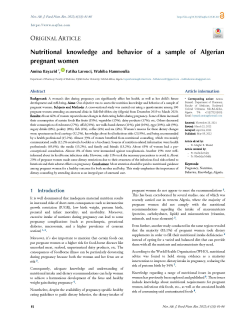Main Article Content
Nutritional knowledge and behavior of a sample of Algerian pregnant women
Abstract
Background: A woman's diet during pregnancy can significantly affect her health, as well as her child's future development and well-being.
Aims: Our objective was to assess the nutrition knowledge and behavior of a sample of pregnant women.
Subjects and Methods: A cross-sectional study was carried out using a questionnaire among 100 pregnant women attending an antenatal clinic in Sidi-Bel-Abbes city (Algeria) from December 2019 to March 2020.
Results: About 46% of women reported some changes in their eating habits during pregnancy. Some of them increased their consumption of certain foods like fruits (35%), vegetables (15%), dairy products (17%), etc. Others decreased their consumption of red meats (27%), offal (26%), raw milk-based cheeses (11%), pâté (10%), eggs (10%), salt (9%), sugary drinks (8%), poultry (8%), fish (6%), coffee (4%) and tea (4%). Women’s reasons for these dietary changes were: spontaneous food cravings (52.2%), knowledge about food infectious risks (23.9%), and being recommended by a health professional (15.2%). Almost 33% of women benefited from nutritional counseling, which was mainly communicated orally (12.2% received a booklet or a brochure). Sources of nutrition-related information were: health professionals (69.6%), the media (15.2%), and family and friends (13.2%). About 63% of women had a pre-conceptional consultation. Almost 4% of them were immunized against toxoplasmosis. Another 19% were well-informed about its food-borne infectious risks. However, only 11% took the necessary precautions to avoid it. About 23% of pregnant women made some dietary restrictions due to their awareness of the infectious food risks related to listeriosis and their adverse effects on pregnancy.
Conclusions: More attention should be paid to nutritional guidance among pregnant women for a healthy outcome for both mother and baby. This study emphasizes the importance of dietary counseling by attending doctors as an integral part of antenatal care.







